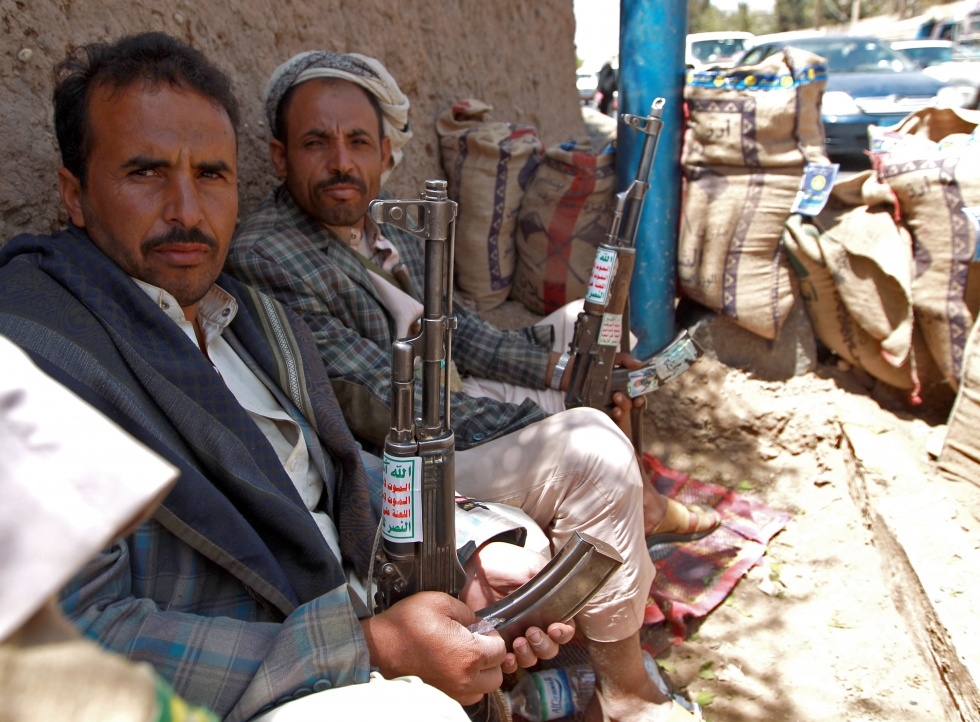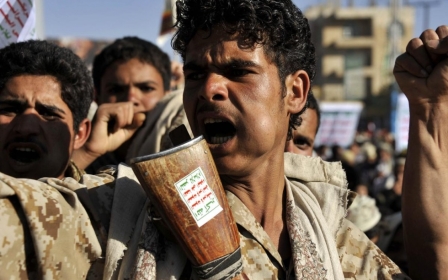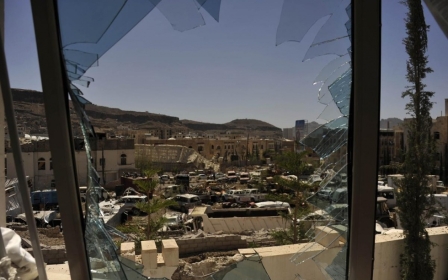Yemen: More war on the horizon

Despite last week's appointment of a new UN peace envoy to Yemen, and parties to the conflict either calling for dialogue or floating their own proposals, there is nothing on the horizon to suggest that meaningful talks will take place any time soon. Defiant actions and statements on both sides suggest that each believes time and circumstances are on their side, and that continued hostilities will result in better terms at the negotiating table.
An Iranian announcement of an impending ceasefire last week came to nothing, and the announced end of Saudi-led Operation Decisive Storm has not quelled the fighting. On the contrary, airstrikes continue and ground combat is intensifying.
Yemeni fighters say they will take on the Iranian-backed Houthis and forces loyal to ousted President Ali Abdullah Saleh even if the airstrikes stop. Meanwhile, Riyadh is arming and training Yemeni tribesmen, and moving its National Guard to the border.
The Houthis have balked at the conditions placed by Saudi Arabia and Yemen's internationally recognised government: that the former must lay down their arms and withdraw from seized territory, including the capital Sanaa, before negotiations can take place.
The Yemeni government has responded to a call for peace talks from Saleh - whose decades of dictatorship led to the popular revolution that brought about his removal, and whose forces are fighting alongside the Houthis - by insisting that "there can be no place" for him "in any future political talks".
In effect, amid mutual talk of the need for dialogue, the warring parties are gearing up for more conflict, confident that they will prevail.
Coalition advantages
Riyadh senses that it has a distinct military advantage. It easily and quickly put together a regional coalition, has air supremacy over Yemen, various allied forces on the ground, and support from Western allies (Washington has stepped up weapons deliveries to the coalition).
The Houthis and Saleh, on the other hand, are relatively isolated regionally and internationally. Iran, which backs the Houthis, does not have the leverage in Yemen that it has in Syria or Iraq, particularly since Yemen is geographically further away and under coalition blockade. As such, it is difficult for the Houthis or Saleh to receive weapons or fighters from abroad.
An awareness of this lack of Iranian leverage has likely contributed to the Saudi and Yemeni governments rejecting mediation by Tehran, which proposed a four-point peace plan earlier this month.
"Any mediation effort coming from Iran is unacceptable because Iran is involved in the Yemen issue," said Yemeni Foreign Minister Riyadh Yassin. "Iran has become a major part of the Yemeni crisis and those who are a party to the crisis... cannot become mediators."
Saleh and the Houthis have been further isolated by a UN Security Council resolution on 14 April, which imposes an arms embargo on the Houthis, demands that they withdraw from captured territory, and slaps a global asset freeze and travel ban against Saleh's son, Ahmed and Houthi leader, Abdul Malik al-Houthi.
The Houthis "attempted to unilaterally replace the legitimate government of Yemen with an illegitimate governing authority that the Houthis dominated," reads the resolution, which was backed by all but one of the 15 council members.
Iran's staunch ally, Russia - which has been vocally critical of Operation Decisive Storm - abstained instead of using its veto. Other countries that have expressed opposition - or at least reservations - over the operation have been careful to avoid damaging relations with members of the coalition, which includes the oil and gas-rich Gulf states, and geopolitically important countries such as Egypt and Jordan.
The coalition has managed to destroy much of the heavy weaponry of the Houthis and Saleh, and forces loyal to the latter have reportedly defected to the Yemeni government. Furthermore, the alliance between the Houthis and Saleh is one of convenience rather than trust, friendship or ideological common ground.
These unlikely partners were at war with each other from 2004 to 2010, and the Houthis joined the revolution against Saleh. As such, the strength and longevity of this alliance is questionable.
Problems ahead
Given all these considerations, Riyadh feels that it can continue its operations at least beyond the short-term, and that its opponents cannot withstand a war of attrition. However, the longer it goes on, the more problems it could pose for the kingdom. A protracted conflict may put stresses on the coalition and eventually some members may pull out or reduce their contributions.
It could also erode external and even domestic support for the campaign among member states and Yemenis, and encourage critics to be more vocal, if no light is seen at the end of the tunnel. So far, the campaign cannot be described as a success.
"The primary goals of Operation Decisive Storm have been achieved," said Saudi spokesman Brigadier General Ahmed al-Assiri upon announcing its end. "The operations were conducted with precision," and "the Yemeni citizen is no longer subject to dangers," he added. "The Yemeni government will now undertake all necessary operations to recover and rebuild the country."
However, the growing civilian death toll calls into question the precision of airstrikes. Furthermore, a humanitarian disaster is unfolding, the campaign has so far failed to significantly alter the balance of power on the ground, al-Qaeda in the Arabian Peninsula has made gains in Yemen, and the Islamic State has established a foothold there. None of this suggests that Yemenis are "no longer subject to dangers".
In addition, how can the Yemeni government begin to "recover and rebuild the country" when it is still in exile, and the prospect of its return to Sanaa any time soon so remote?
The longer the conflict goes on, the less any party will be able to reasonably claim victory over the ruins of a shattered, impoverished and divided nation. Both sides think time is on their side, but time is a luxury Yemenis cannot afford.
- Sharif Nashashibi is an award-winning journalist and analyst on Arab affairs. He is a regular contributor to Al Arabiya News, Al Jazeera English, The National and The Middle East magazine. In 2008, he received an award from the International Media Council "for both facilitating and producing consistently balanced reporting" on the Middle East.
The views expressed in this article belong to the author and do not necessarily reflect the editorial policy of Middle East Eye.
Photo: Houthi fighters in Yemen's capital, Sanaa (AFP)
New MEE newsletter: Jerusalem Dispatch
Sign up to get the latest insights and analysis on Israel-Palestine, alongside Turkey Unpacked and other MEE newsletters
Middle East Eye delivers independent and unrivalled coverage and analysis of the Middle East, North Africa and beyond. To learn more about republishing this content and the associated fees, please fill out this form. More about MEE can be found here.





